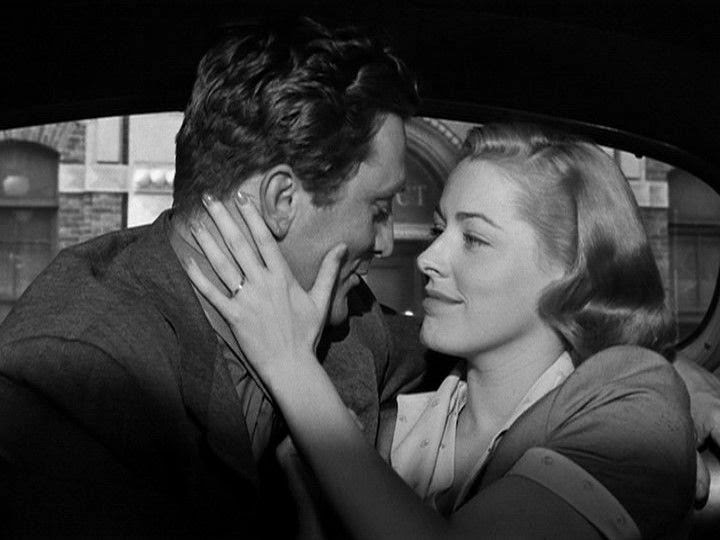William Wyler, 1951
Starring: Kirk Douglas, Eleanor Parker, William Bendix
A typical day at the 21st police precinct begins with the arrest of a shoplifter, a young, desperate woman who witnesses the events that transpire around her. Detective McLeod says a romantic farewell to his lovely wife, Mary, before he attends to Arthur, a young man who stole money from his boss. McLeod is distracted by a case he has been working on for several months, the prosecution of Dr. Schneider, a suspected abortionist with several dead patients. Meanwhile, McLeod and his partner interrogate two thieves, Gennini and Abbott. The day comes to ahead when McLeod’s boss, the Lieutenant, learns that there is a connection between Dr. Schneider, and McLeod’s wife, Mary…
Based on Sidney Kingsley’s play of the same name, director William Wyler (Roman Holiday, Desperate Hours) took advantage of limited sets are used to heighten the claustrophobia and track the emotional breakdowns of McLeod and several of the criminals throughout the film. Aside from a series of very strong performances, Detective Story is notable for two plot elements that went against the Production Code. First is the mention of abortion, which is not stated outright but is skirted around — Mary admits that she was pregnant and forced to take care of the situation, McLeod describes Dr. Schneider’s office as like a slaughterhouse, and his most recent patient dies on the operating table. Though the element of a backdoor abortionist is relatively minor within the film at large — McLeod’s drama with his wife becomes the central plot around which everything else revolves — it’s still memorably grisly.
This was also the film that prompted the Production Code to change their policy that a police officer could not be killed on screen. Without giving anything away, I can say that it was allowed here because it’s crucial to the film’s plot and was not presented as a premeditated act, but something that occurred in the heat of moment. McLeod is also an example within noir of a flawed, violent cop. McLeod’s father was a criminal, which is meant to explain so much of his rage and hatred, his bad temper and occasionally violent explosions. There is surprisingly a lot of sympathy and understanding from many of the other cops towards the criminals in the police station, which is in contrast with McLeod whose mindset is “once a criminal, always a criminal.”
Detective Story is definitely Kirk Douglas’s film. As McLeod, he offers yet another example of his wide range and ability to portray an unlikable, yet sympathetic character. His violent, troubled cop must contend with far more than his inner demons — he must also face the fact that his sweet, innocent wife was once a gangster’s girlfriend, got herself pregnant, and sought an abortion. Eleanor Parker (Caged, The Sound of Music) is wonderful as his wife Mary, though the script limits her from reaching her full potential in the role. She received an Academy Award nomination for her performance, alongside then newcomer Lee Grant (In the Heat of the Night) as the shoplifter. Grant was in the original play and reprised her role to acclaim; unfortunately for her, she was one of many blacklisted by HUAC and didn’t return to work in Hollywood for more than decade.
Look out for other welcome performances from other noir regulars like William Bendix (Lifeboat) as McLeod’s partner, Cathy O’Donnell (They Live By Night) as the young thief’s love interest, and George Macready (Gilda) as the cold, sinister abortion doctor. The wonderful Joseph Wiseman (Dr. No) puts in a memorable turn as Gennini — in one of his first performances — a burglar beginning to psychologically crack throughout the course of the day’s events. And though the set is small, it is well shot and helps crystallize the environment of abortion, violence, theft, murder, and psyches bought to a dangerous boil by the hot weather and building tension. Detective Story — ultimately an investigation of the circumstances that make people turn to crime — comes recommended and is available on DVD.


No comments:
Post a Comment